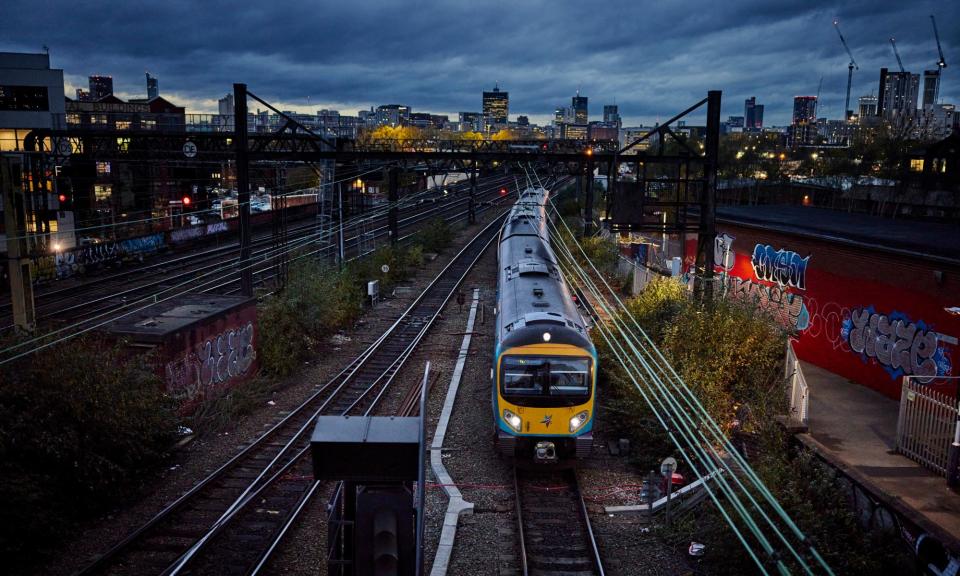What is Labour’s plan for rail travel and will it make tickets cheaper?

Labour has made one of its most radical proposals yet in the run-up to an election campaign: to fully nationalise the train network within five years of coming to power.
The party has pledged to guarantee the cheapest fares as part of “the biggest reform of our railways for a generation”, bringing all passenger rail into national ownership under the Great British Railways (GBR) body.
So, how difficult would the plan be to enact and what does it mean for passengers?
How would Labour’s plan for Great British Railways change the way the trains are run?
The headline change is nationalisation: the ambition that all passenger train operations, at least, should return to public ownership. But the wider aim is that control of trains and tracks – “wheels and steel”, as some put it – is brought back under one unified structure, at arm’s length from the government.
The actual railway infrastructure is already managed by the state-owned Network Rail, since the disastrous tenure of Railtrack in the early days of privatisation, and train operations in Scotland, Wales and a large chunk of England are in public ownership. So a fully renationalised railway (bar the rolling stock and freight) is not as big a step as it may once have sounded – and arguably the pragmatic extension of the plans drawn up by the Conservatives in 2021, to end the fragmentation and waste in the system.
How long will the changes take?
Labour said it would get the ball rolling on day one. Given the years it has taken for the Conservatives’ GBR plans to crystallise into a draft bill that has scant chance of passing before an election, supporters of the changes would be forgiven for not holding their breath for legislation. But some of the spadework has been done by the GBR transition team, and Labour will be hoping for a more stable tenancy in Downing Street to see the policy through. It is, it stresses, a long-term plan.
As far as nationalisation of the train operators goes, most of the contracts of remaining operators will expire naturally within the next term, while the government can exercise break clauses in others, such as Avanti West Coast and Cross Country.
What would the trains look like?
Eventually, they would all be GBR-branded trains rather than the individual liveries and logos of different operators. Labour hopes that this will make things simpler for passengers, avoiding confusion over ticketing, as well as cutting costs.
Would it make train travel cheaper?
Possibly, but not for a while yet. Labour says it wants to make the railway more affordable but has definitively avoided any pledges to cut or even freeze the overall level of fares.
However, it believes that its plans will eventually save £2.2bn a year by avoiding the duplication and bureaucracy brought on by the current system, where the Department for Transport tightly controls and specifies contracts for the private firms, and reams of staff are employed in back-end roles. That could give ministers some scope to use more of the billions in annual taxpayer subsidy to bring fares down long-term.
What about this best-price guarantee?
Make that an “ambition”, according to the policy document. It’s testament to the complexity, or occasional absurdity, of UK rail fares that even after years of industry focus on improving the system, renationalising looks an easier promise than telling a passenger they’ve paid the right amount.
Things can be improved, Labour says, as contactless tap-in and tap-out payments extend through more and more of the country, opening up the possibility of a Transport for London-style system, where fares are streamlined and automatically capped or refunded.
The shadow transport secretary, Louise Haigh, pointedly chose the headquarters of Trainline in central London to launch her plans on Thursday, paying tribute to the travel app firm’s “relentless focus on passengers [and] improving their experience”. Trainline shares fell 10%, even though Labour says it has no plans to replace the private firm with a single state retailer.
But given that the app’s business depends on people paying extra to cut through the railway’s confusing fares, fragmentation and lack of a decent central ticketing site, Trainline shareholder nerves might be taken as a vote of confidence that GBR will improve the industry’s own offering.
How else might passengers benefit?
Labour says it would leave the running of the railway to the experts – but the transport secretary would set strategy and take on the role of passenger-in-chief, and the industry would not be “marking its own homework”.
The plan aims to strengthen the voice of passengers by rolling together the various bodies currently meant to be standing up for them – the watchdog Transport Focus and the little-known Rail Ombudsman, as well as a few divisions of the Office of Rail and Road.
What will happen to the private operators?
Their representatives at Rail Partners warn that it will be “messy” and the railway will lose their expertise. But the people actually running train operators, right up to the managing directors, have typically stayed in post with a different coloured badge when the owning groups moved on, and passengers at say, Southeastern or LNER may not feel life is very different. Firms once regarded as pillars of privatised rail such as Stagecoach, National Express (now Mobico) and Virgin have long exited UK rail already, pursuing business elsewhere.

 Yahoo Finance
Yahoo Finance 